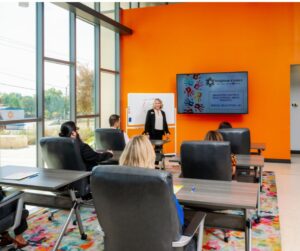“What mental health needs is more sunlight, more candor, and more unashamed conversation.” — Glenn Close
January is Mental Wellness Month. Many people overlook Mental Wellness even though it affects nearly every aspect of our lives. Everything from our physical health to cognitive functioning and our relationships. In honor of this month, we will delve into why and how special education plays a crucial role in addressing mental health issues among students with disabilities. Individuals with special needs may face additional challenges related to their mental health, such as anxiety, depression, attention-deficit/hyperactivity disorder (ADHD), autism spectrum disorders, and more.
In addition to mental health wellness being crucial in the academic setting, mental health awareness in special education is essential to ensure that students with disabilities receive the support they need to thrive socially and emotionally at school. Continue reading for more information on ways in which special education addresses mental wellness.
“We would never tell someone with a broken leg that they should stop wallowing and get it together. We don’t consider taking medication for an ear infection something to be ashamed of. We shouldn’t treat mental health conditions any differently.” — Michelle Obama

Individualized Education Programs (IEPs)
Special education typically involves the development of Individualized Education Programs for students with disabilities. Educator tailor these plans to the specific needs of each student and may include strategies to support their mental health. For example, tailored services, accommodations, and modifications can be made to the learning environment, instructional methods, and assessment techniques to address each student’s individual needs.
Many students with special needs may exhibit challenging behaviors that can be linked to mental health issues. Consequently, special education programs often incorporate behavioral interventions and supports to address these behaviors. This may involve positive behavior support plans, counseling, and social skills training.
“Mental health problems don’t define who you are. They are something you experience. You walk in the rain, and you feel the rain, but you are not the rain.” — Matt Haig
 Inclusive Education and Preparing for the future
Inclusive Education and Preparing for the future
Inclusive practices that promote a sense of belonging for students with disabilities can positively impact mental health. Furthermore, inclusive classrooms encourage socialization, peer support, and a supportive community. Educators should receive training in inclusive teaching methods that consider the diverse needs of students with various disabilities. Additionally, with inclusive education, where students with disabilities receive education alongside their non-disabled peers, special education services can positively foster relationships. Inclusive environments promote socialization, peer support, and a sense of belonging, which are essential for mental well-being.
Social Emotional Learning (SEL) Programs
Integrating Social Emotional Learning (SEL) programs into the curriculum can help students develop emotional intelligence, self-awareness, and interpersonal skills. Moreover, educators tailor SEL initiatives to the specific needs of students with disabilities and incorporate them into daily classroom activities. Additionally, special education programs can actively work to prevent bullying and create a safe and inclusive school environment. Bullying can significantly impact the mental health of students, and targeted interventions are crucial.
For students with disabilities, the transition from school to adulthood is a critical period. In fact, special education programs often include transition planning that considers mental health needs, ensuring a smooth transition to post-school life. By incorporating these strategies, special education aims to create a supportive and inclusive learning environment that addresses the unique mental health needs of students with disabilities.
“I think it’s important to take the stigma away from mental health… My brain and my heart are really important to me. I don’t know why I wouldn’t seek help to have those things be as healthy as my teeth.” — Kerry Washington

Counseling and Support Services for Mental Wellness
Special education may provide access to counseling and support services to address the mental wellness needs of students. Furthermore, school psychologists, counselors, and social workers may work closely with students to provide emotional support, coping strategies, and intervention plans.
Special education teams often collaborate with mental health professionals, including psychologists, psychiatrists, and therapists. This collaboration helps in the identification and assessment of mental health concerns, as well as the development of appropriate interventions and strategies. Moreover, considering the potential impact of trauma on the mental health of students with disabilities, educators should be trained in trauma-informed practices to create a safe and supportive learning environment.
Schools and special education programs can engage in community outreach to raise awareness about mental health for students with disabilities. In addition, collaborating with community organizations, mental health agencies, and advocacy groups can help create a network of support for students and their families.
“Mental health affects every aspect of your life. It’s not just this neat little issue you can put into a box.” — Shannon Purser
 Mental Health Training for Educators and Parents
Mental Health Training for Educators and Parents
Special education programs often provide training for educators to recognize and respond to signs of mental health issues in students. Consequently, educators should be equipped with strategies for creating a positive and supportive classroom environment. Such an environment fosters the mental well-being of all students. Furthermore, this training may include strategies for creating a supportive classroom environment and fostering positive relationships with students.
Special education involves collaboration with parents and guardians. In fact, educating parents about mental health issues, providing resources, and involving them in the development and implementation of support plans contributes to a holistic approach to addressing mental wellness in students with disabilities.
By training parents and educators, special education aims to create a supportive and inclusive learning environment. This environment is one that addresses the unique mental health needs of students with disabilities. Specifically, ongoing professional development for educators in special education can include training on recognizing and addressing mental health issues.
“You are not your illness. You have an individual story to tell. You have a name, a history, a personality. Staying yourself is part of the battle.” — Julian Seifter
 How Brighton Center Can Help Parents and Caregivers
How Brighton Center Can Help Parents and Caregivers
Brighton Center advocates for mental wellness programs within the schools. We work with the school to ensure that mental health services are integrated into your child’s Individualized Education Program. Brighton provides community outreach by offering mental wellness and awareness workshops and training sessions free to parents. We also offer mental health services, evaluations, and referrals at our centers.
Additionally, Brighton Consultants can serve as a mentor, review your child’s IEP, and discuss concerns with recommendations on next steps. Furthermore, we walk you through the ARD meeting process and attend ARDs to ensure the actions taken are in your child’s best interests.
If you would like more information or assistance, please fill out this inquiry form.















